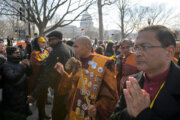GODWIN ISENYO
Associated Press
ABUJA, Nigeria (AP) — Nigerian security forces are holding one man connected to the Wednesday double bombings in the northern city of Kaduna that targeted a former head of state and a prominent moderate Muslim cleric and killed at least 44 bystanders, according to a defense ministry statement on Friday.
The unnamed suspect, a young man dressed as a woman, was arrested immediately after the attempted assassination of former military head of state Muhammadu Buhari in a crowded Kaduna marketplace. Buhari and the cleric both escaped the bombings unharmed.
The suspect was “disguised as a woman clad in female garb to exude femininity,” according to the statement.
No group has claimed responsibility for the attacks but Boko Haram, a five-year-old Islamist extremist rebel group, is widely blamed. In recent months, Boko Haram has stepped up its violent attacks, killing more than 2,000 people so far this year, according to Human Rights Watch.
“The assassination attempt once again demonstrated the annihilating danger faced by the Nigerian state,” said Shehu Sani, a Nigerian politician and president of the Civil Congress of Nigeria, in a statement Friday. “The attack, if successful, could have triggered serious civil unrest.”
Since Wednesday, at least 57 people have been killed in attacks and Nigerian forces this weekend are increasing security ahead Eid al-Fitr, the Muslim celebration marking the end of Ramadan, according to Emmanuel Okeh, a spokesman for the Nigeria Security and Civil Defence Corps.
Heightened security measures are due to “tensions that sometimes worsen during festivities,” Okeh said in a statement on Friday.
Late Wednesday night, suspected Boko Haram members dressed in camouflage stormed a village in Borno state, killing the traditional leader and 11 others. On Thursday, a busy bus station in Kano, Nigeria’s second-largest city, was bombed, killing one person and injuring eight nearby a bus station that was bombed in May, killing 30 people.
Rose Charles, who sells rice and plantain to hungry travelers in Kano bus stations, survived both blasts. She said she saw at least three people killed in the most recent attack. “Thank God I escaped the second blast,” she said.
Three states in Nigeria’s northeast have been under emergency rule for more than a year, but in this week’s violence, all but 12 of the victims were outside the security zones.
Since April, Boko Haram has bombed the capital, Abuja three times after two years of relative peace. More than 115 people were killed in bombings of a suburban bus station and a downtown shopping mall.
Three months ago Boko Haram became infamous around the world when it kidnapped more than 200 schoolgirls.
Efforts to stop the insurgency are stymied by “political bickering” as parties play the “blame game,” rather than working together to secure northeastern Nigeria, said politician Sani. “The series of campaign and violence is the most imminent and concrete threat to Nigeria’s unity, freedom and democracy.”
Copyright 2014 The Associated Press. All rights reserved. This material may not be published, broadcast, rewritten or redistributed.







